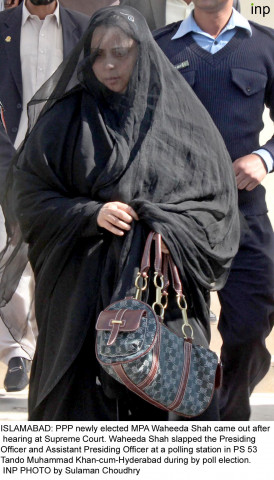The swagger of Waheeda Bukhari
The suo motu notice has highlighted a societal malaise that haunts Pakistan: the powerful will get away with anything.

The effect was stunning. Chief Justice of the Supreme Court, Iftikhar Mohammad Chaudhry was understandably stung by the incident into issuing her the notice. There is so much going on in the country that he is helpless to take action simply because of the scale and complication of our law and order situation; this time he simply had to act, not only to make the people realise that this kind of action cannot go unpunished but also to shake-up the relevant institution that should have taken prompt action after the entire country had seen an elitist politician inflict injury on a schoolteacher. Of course, the relevant institution was the Election Commission of Pakistan (ECP), which nobody expected to do the needful given its past reputation for being lax in its supervision of elections.
Waheeda Shah Bukhari was winning in the initial vote count and had no need to throw her weight around, accompanied by a police security officer who simply added to her feudal panache. After seeing the outrage on TV, the ECP sealed the results of the PS 53 election. Its officers explained that the polling officer whom the PPP candidate slapped, had a first class magistrate’s powers and could have heard the case of assault right at the polling centre and sent Bukhari to prison. This, of course, is easier said than done. In fact, the law can be called a ‘bad law’ on the basis of a lack of realism and total absence of an enabling environment. Bukhari was in fact more ‘empowered’ because of her police guard than the unfortunate schoolteacher she beat up.
The three-member Supreme Court bench that finally examined Bukhari, was clear about what she had coming: under penal code sections 353 and 189, she could face a two-year prison term and a hefty fine. She tried to disarm the court by appearing under veil and without a lawyer, throwing herself at the mercy of the Court. The only thing she had going for her was that she had carefully orchestrated an on-camera apology to the hurt schoolteacher, shown by some TV channels with the caveat that the ‘forgiving’ victim was too hidden behind her veil to be recognised. The court understandably rejected her apology and went into the details of the case to probe why the incident took place. The inspector general (IG) of the Sindh police was hauled up and asked why he should not be dismissed because his department had failed to protect the polling staff.
The suo motu notice has served to highlight a societal malaise that haunts Pakistan: the powerful will get away with anything. And that includes non-state actors, once produced by the state committing acts of terrorism without getting convicted at the court of law. Who is going to ensure that the assaulted schoolteacher will fight the case to get Bukhari punished under the law? How will Justice Iftikhar Chaudhry respond to the remark made by the IG Police about his policemen getting thrashed by a gang led by the son of the Chief Minister of Balochistan in Karachi? It is correct to make an example out of Bukhari, but it is also important to inquire into why the killer of the Shia community, Akram Lahori, is about to go scot-free because his powerful terrorist group in South Punjab had made the witnesses run away. Another case pertains to Major (retd) Haroon Ashiq, facing trial for the murder of a senior army officer in Islamabad at the behest of al Qaeda.
Published in The Express Tribune, March 4th, 2012.















COMMENTS
Comments are moderated and generally will be posted if they are on-topic and not abusive.
For more information, please see our Comments FAQ